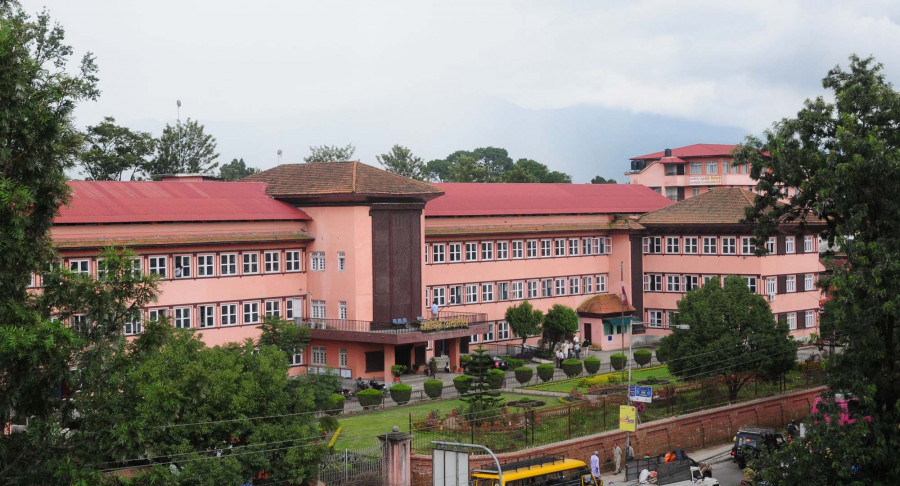National
Power sharing cases pile up at constitutional bench
Constitutional experts say devolution of power between various tiers of government has been hampered due to the bench’s failure to issue verdicts without delay.
Binod Ghimire
The Province 2 government last week moved the Supreme Court against the federal government saying it interfered with its constitutional authority to execute irrigation projects.
Jitendra Sonal, the province’s minister for Physical Infrastructure Development, filed the petition against bids issued by the Department of Irrigation, which falls under the ambit of the federal government, to implement the Prosperous Tarai Madhes Special Irrigation Programme.
This is the sixth writ petition the provincial government has filed at the Supreme Court seeking its intervention to stop the federal government from allegedly breaching the provisions of the constitution.
However, the court hasn’t issued its final verdict in any of the petitions so far.
The constitutional bench, which has remained indifferent towards resolving constitutional issues such as those raised by Province 2, is comparatively prompt when it comes to matters related to political figures.
Responding to the writ petition filed against the nomination of Nepal Communist Party’s leader Bamdev Gautam to the National Assembly, the constitutional bench held three hearings, that too within a month. Though the final verdict in the case is due, the bench has given its consent to Gautam’s nomination through an interim order.
Raju Prasad Chapagain, chairperson of Constitutional Lawyer’s Forum, has a similar observation. “It’s a fact that the entire judiciary, including the constitutional bench, is prompt when it comes to cases related to political figures,” he told the Post. “But it has to demonstrate more urgency in cases related to constitutional issues.”
Constitutional experts say while every case needs to be finalised promptly, cases related to implementation of federalism should be prioritised over political issues that don’t have much legal implications.
The Supreme Court has the authority to interpret the provisions of the constitution and its constitutional bench can also resolve disputes over the jurisdiction of various tiers of government. Its verdicts on the interpretation of the constitution and resolution of disputes between provinces set precedents that have a standing equivalent to the legislature-made laws.
Experts say the indifference of the Supreme Court towards passing verdicts on writ petitions such as those filed by Province 2 is the reason behind delay in devolution of power.
During the constitution drafting phase, a large group of lawmakers were in favour of a separate constitutional court with limited tenure to resolve disputes between the three tiers of government. However, parties agreed to form a constitutional bench within the Supreme Court, instead.
But the bench has become largely ineffective, observers say.
Ram Krishna Timilsena, former registrar at the Supreme Court and executive director at National Law College, said the constitutional bench suffers from a serious managerial problem that needs to be resolved at the earliest. As five justices from the Supreme Court constitute the bench, they can’t focus only on cases presented before the constitutional bench. “Also, it took time to set up the bench and the Covid-19 pandemic has further slowed things down,” he told the Post.
Provincial governments say the Supreme Court is their only hope when it comes to claiming their constitutional rights, and delay in verdicts worries them. “We don’t know when the provinces will get justice,” Gyanedra Yadav, Province 2 minister for Internal Affairs and Law, told the Post. “We expect the judiciary shows some urgency in the constitutional matters.”
It was on August 1, 2019, that the Province 2 government filed the first writ petition against the federal government. It had challenged the decision of the Ministry of Forest to merge Sagarnath Forestry Development Project with Timber Corporation of Nepal. The constitutional bench had issued an interim order in the Provincial government’s favour, but the final verdict is due.
The provincial government had last month filed another writ petition against the federal government’s handling of provincial police-related issues. Similarly, in June, another writ petition was filed against some of the provisions of Federation, Provinces and Local Level (Coordination and Inter-relations) Act. However, the court is yet to pass verdicts on all these petitions.
Officials at the Supreme Court say the court gives equal priority to all cases, but some take longer than others to hear. “Issues related to constitutional matters are sensitive and serious in nature. It takes time to follow the due process,” Bhadra Kali Pokharel, spokesperson for the Supreme Court, told the Post. “I don’t think the constitutional bench has given undue priority to political cases.”
Kishor Poudel, communication expert at the court, however, agrees that the constitutional bench has been running slow. He said over 250 cases have been filed before it so far. “However, final verdicts have been passed only in very few cases,” he told Post.
Meanwhile, experts on federalism say the provincial government should focus on resolving disputes over jurisdiction through political dialogue, rather than move the court. Khim Lal Devkota, who writes extensively on federalism, said the provinces should press the federal government to covenven the Inter Provincial Council led by the prime minister to resolve such issues. “Our judiciary is very political in nature,” he told Post. “The provinces will not have any options left if the constitutional bench gives a verdict against them. So, moving to the court should be their last resort.”




 18.12°C Kathmandu
18.12°C Kathmandu














